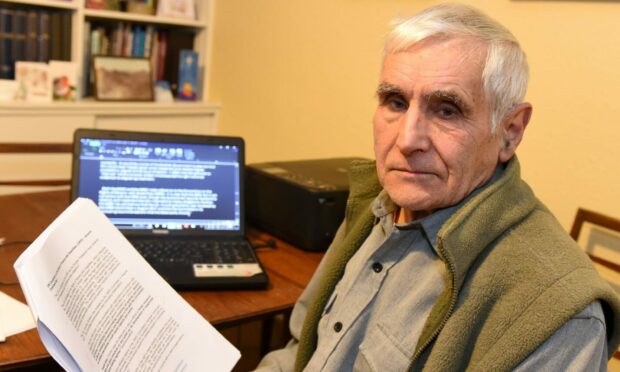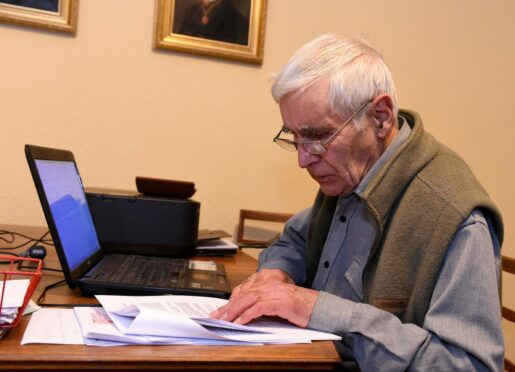An Aberdeen man is making another push to protect care home residents like his late mother from inadvertently taking concealed antipsychotic drugs.
Hunter Watson, 87, has been trying to outlaw hidden medication in patients’ food and drink ever since Helen Watson died in January 2000.
She had antipsychotic drugs concealed in her food while she had dementia and was living in a care home.
Mr Watson wants the Scottish Government to review all mental health legislation and keep it in line with the UN Convention on the Rights of Persons with Disabilities.
Years of campaigning
“When prescribing for the elderly you need to balance the risk and benefit before prescribing antipsychotic drugs,” he said.
“In my opinion, this was done to make the residents easier to care for as they are sedated and drowsy.”
He said the mindset is those with dementia can be aggressive and having challenging behaviour, but he said his own mother was “not like that at all”.
He added: “One of the reasons people in care homes can be sedated is because they want to get up and walk about.
“They should be encouraged to get up and walk about – it is very bad for a person’s health to sit still all the time.”
‘It is inhuman and degrading’
In 2007 he submitted a petition to the Scottish Parliament to make concealing drugs in food and drink illegal.
At the time, the Scottish Parliament wrote to the Scottish Government to say it did not condone this “totally unacceptable” practice as it is a breach of human rights.
He has since submitted a number of other petitions to Holyrood, including calls to review mental health and incapacity legislation, and calls for the Mental Health Act 2003 to be amended to make sure it is compatible with the European Convention on Human Rights.
He said: “I want to stop this because of what happened to my mother.
“When I wrote to the Scottish Government they said it is permissible provided certain precautions are taken – but it is not permissible at all.
“In my opinion, the use of chemical restraint shouldn’t be permitted.
“It is inhuman, degrading, and such treatment should be prohibited in all circumstances.”
He argues this should be extended to mental health patients as well as care home residents with dementia.
Call for mental health law to be reviewed
Mr Watson has now submitted another petition, only two years after his last, asking for mental health legislation to be reviewed once again.
“The government should be fully committed to implementing the ECHR and the UN rights so disabled people in Scotland are able to fully realise their human rights,” he said.
“My petition is asking the Scottish Government to do what the Scottish Parliament said it should do.”
Commitment to protecting human rights
Kevin Stewart, minister for mental wellbeing and social care, said people with dementia should only ever be given psychoactive medication in line with the law, and this should always be under review.
He added the recently-published Scottish Mental Health Law Review has set out over 200 proposals to better protect people’s human rights.
Mr Stewart said: “The review argues the law should ensure that all the human rights of people with mental or intellectual disabilities are protected and fulfilled, but recognises that there may still be times where there is a need for non-consensual intervention in a person’s life.
“Given the range and complexity of the review, we are taking time to carefully consider the recommendations within the report to ascertain how to better fulfil our obligation to promote and protect human rights and to ensure that rights and protections for those that need it most are upheld.”
___________________________________________________________
How Hunter Watson’s long campaign unfolded:
2000 – Helen dies after developing cancer.
2007 – Mr Watson submits a petition calling for concealing medicine in patients’ food and drink to be made illegal. The Scottish Parliament said this practice is “totally unacceptable” as it is a breach of human rights.
2013 – Another petition calls for the Mental Health Act 2003 to be amended to make sure it is compatible with the European Convention on Human Rights. MSPs close this petition.
2019 – Mr Watson submits a petition calling for mental health and incapacity legislation to be reviewed, taking into account recent developments in international human rights law. MSPs reject this call.
2021 – He submits a petition to investigate why so few prosecutions have been made under the Mental Health Act 2003. He said there are too few prosecutions considering thousands are subjected to compulsory treatment.
2023 – Mr Watson submits a petition calling for the UN Convention on the Rights of Persons with Disabilities to be fully implemented in Scotland.



Conversation